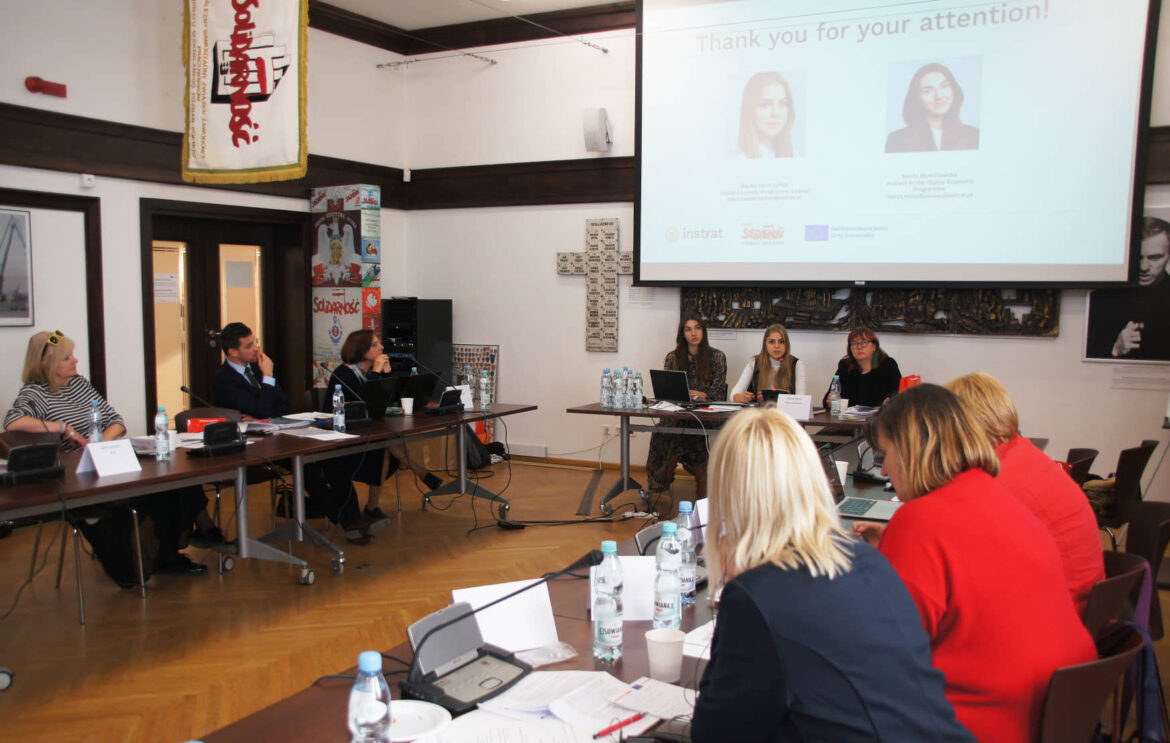Project Title: “Initiating Activities to Implement the European Social Partners Framework Agreement on Digitalisation (EFAD)”.
This project is based on the European document „Framework Agreement of European Social Partners on Digitalisation” – signed on the 22nd of June 2020 by the European Social Partners, which is a response to changes taking place on the labour market in connection with the digital transformation concerning, among others: production, technologies, business models, employee training, remote work and management methods in companies.
The COVID-19 pandemic has accelerated the introduction of these changes for businesses and the use of digitization-driven solutions and outline services. In response to the pandemic, most of companies changed the way they work, with the communication with customers and suppliers based mainly on digital tools. Unfortunately it also entails numerous risks, as the practices of digital giants include surveillance (access to personal data), discrimination (user exclusion), and manipulation (e.g. micro-targeting for commercial and political purposes). An additional threat is the introduction by employers of algorithms to assess the suitability of an employee, which form the base for decisions, among others, about bonuses or promotions.
For this reason, it becomes necessary to familiarize social partners with the challenges related to the galloping process of digitalization, involving the professional and private spheres. In addition, in the face of an aging society and a growing „demographic gap”, it is increasingly indispensable for older workers to participate in the labor market and to train them in digital skills.
Therefore, the current project aims to:
1.create conditions for the development of National Action Plans to prepare for the implementation of the right to disconnect through the necessary analysis of the existing legal and factual status and the development of a catalog of good practices,
2. increase the knowledge of social partners’ on improving working conditions in the context of the right to disconnect, digital literacy and working time through training and promotional activities.
The project is focused on the challenges, benefits and risks related to the presence or introduction of digital tools in the workplace through expert and training activities targeted at social partners from 5 European countries (Poland, Italy, Romania, Lithuania, North Macedonia) from the national, sectoral, regional and the company levels. Training topics will include: the right to disconnect, data protection and privacy, the use of new technologies in the workplace, protection of employees’ working time in remote work, the differences between remote work and teleworking, prevention of disproportionate and excessive supervision in the workplace, discriminatory treatment based on biased algorithms.
The main activities in the project take place on two tracks – expert and training activities are carried out in parallel.
The goal of the expert activities is to develop National Action Plans in each partner country in order to implement EFAD, particularly in the area of the right to disconnect (R2D) and have them approved by the national representative social partners . Therefore, each expert activity focuses on being well prepared to achieve this goal in the respective partner country, starting with the analysis of relevant background materials and the collection of 6 case studies in each country. These case studies will provide an overview of different approaches to R2D and digital management in companies, as well as a catalogue of good practices. This will give country experts the base and knowledge needed to conduct national workshops leading to the development of 5 National Action Plans and will make them more productive with regard to the implementation of R2D in the context of EFAD.
Meanwhile, training activities will be conducted for representatives of the social partners to promote and raise their awareness of the EFAD content, their involvement in adapting the policies, strategies and internal procedures of enterprises to the current digital changes in the labor market. In order to maximize the effectiveness of these activities, the 5 bilateral trainings for 100 social partner leaders from different levels (country, region, company) will provoke intensive and meaningful exchange of good practices and will be conducted using a diverse methodology: presentations, discussions, individual and group work using creative thinking, brainstorming and role-playing techniques.
The project outcomes:
1. Launching a debate on the Right to Disconnect (R2D) in order to strengthen social dialogue in 5 EU countries by developing National Action Plans in this area.
2. Initiating the implementation of the “Framework Agreement of European Social Partners on Digitization” in partner countries.
3. Development of a new training module that can be widely used in training programs implemented by social partners in the area of digital transformation.
4. Increased knowledge on the subject area covered by the Digitalization Agreement among social partners who are participants and recipients of the project.
5. Increased awareness of the advantages and disadvantages of remote work among social partners at the enterprise level.
6. Conducting a comparative analysis of the collected questionnaires.
7. Development of the Final Report containing the results of the work of the project’s experts, recommendations for social dialogue actors and a catalog of good practices at the European, national and workplace level.
8. Dissemination of the project results.
The project consortium consists of 10 organizations from 5 countries. The leader of the project is the National Commission of NSZZ “Solidarność”, co-applicants are: CISL (Italy), BLOCUL (Romania), Konfederacja Lewiatan (Poland), Instrat Foundation (Poland), and the associated organizations: European Trade Unions Confederation (ETUC), trade unions: LPS „Solidarumas” (Lithuania), KSS (North Macedonia) and employers’ organizations – LDK (Lithuania) and OEM (North Macedonia).
Project is implemented by the National Commission of NSZZ „Solidarność” under the European Commission budget line SOCPL-2021-SOC-DIALOG sub-measure „Support for Social Dialogue”.
Project duration: 24 months, 1st September 2022 – 30th August 2024
About first SG meeting in Gdanks: https://www.lps.lt/kaip-bus-igyvendinta-teise-atsijungti/
